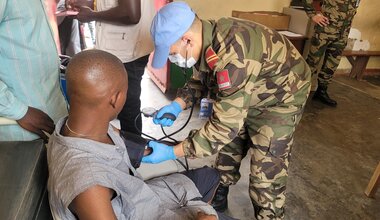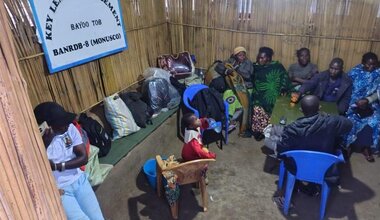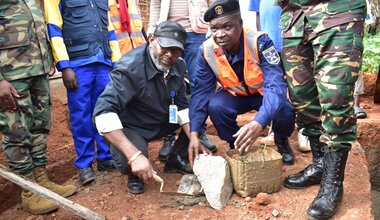World Radio Day: MONUSCO recalls radio unique role in times of emergency and disaster
Kinshasa, 13 February 2016 – The fifth world radio day will be celebrated on 13 February 2016. The objective of this day is to promote and foster international cooperation among broadcasters, to encourage decision makers to provide access to information through radio, including community radios and to promote freedom of expression when broadcasting.
« Radio remains the most universal medium up to date. An inexpensive medium that requires relatively simple technology, radio broadcasting reaches policy-makers, remote communities and marginalized groups alike. A free, independent and pluralistic radio is indispensable for strong societies ; it is a vital element to promote human rights and fundamental freedoms, » stated Maman Sambo Sidikou, Special Representative of the United Nations Secretary-General in the DRC.
« Radio in Times of Emergency and Disaster » is the theme for this world day. Indeed, the world is facing an increasing number of disasters that affect a growing number of people. Before or after a disaster, radio has demonstrated its usefulness by airing alerts. This medium thus plays a pivotal role in preventing and mitigating disasters and the associated human costs, because it is accessible, available, offering real time coverage.
« I congratulate and encourage the Congolese Government to always accompany the radios and preserve a space of freedom and expression for journalists,” concluded Maman Sambo Sidikou. Moreover, he also called on radio stations and journalists to exercise their functions with greater sense of responsibility in promoting peaceful coexistence of the population.
Notes to the Editors
Radio is a vector of freedom and some famous radios will be remembered by history: Radio-Londres which broadcasted messages to the French Resistance during the dark hours of Nazi occupation of France ; Radio Free Europe which allowed people located behind the Iron Curtain to receive information different from that which was transmitted by the authorities; Radio Caroline which operated from a boat or the epic story of independent radios in 1981 with the end of state monopoly on broadcasting in France.
The date, 13 February, was adopted by UNESCO’s 36th Conference on 3rd November 2011, following a request from Spain. Since then, it has been celebrated each year on 13 February, the anniversary of the first broadcast by United Nations radio in 1946.
According to the International Telecommunication Union, more than 80% of households in developing countries possess a least one radio set.
 UN
UN United Nations Peacekeeping
United Nations Peacekeeping




